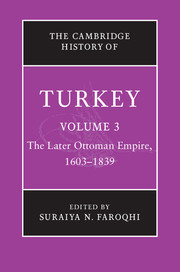Book contents
- Frontmatter
- PART I BACKGROUND
- PART II AN EMPIRE IN TRANSITION
- PART III THE CENTRE AND THE PROVINCES
- PART IV SOCIAL, RELIGIOUS AND POLITICAL GROUPS
- 10 The Ottoman ulema
- 11 Muslim women in the early modern era
- 12 The Ottoman Jews
- 13 Christians in a changing world
- PART V MAKING A LIVING
- PART VI CULTURE AND THE ARTS
- Glossary
- Bibliography
- Index
- References
13 - Christians in a changing world
from PART IV - SOCIAL, RELIGIOUS AND POLITICAL GROUPS
Published online by Cambridge University Press: 28 March 2008
- Frontmatter
- PART I BACKGROUND
- PART II AN EMPIRE IN TRANSITION
- PART III THE CENTRE AND THE PROVINCES
- PART IV SOCIAL, RELIGIOUS AND POLITICAL GROUPS
- 10 The Ottoman ulema
- 11 Muslim women in the early modern era
- 12 The Ottoman Jews
- 13 Christians in a changing world
- PART V MAKING A LIVING
- PART VI CULTURE AND THE ARTS
- Glossary
- Bibliography
- Index
- References
Summary
Christians constituted a significant minority of the population of the Ottoman Empire in the seventeenth and eighteenth centuries, although their actual numbers is a matter of scholarly speculation. The obscurity in the historical record reflects the deterioration in the regularity and accuracy of the registration of individual adult non-Muslim males for taxation (cizye) from the practice of the previous century when the central government was in a better position to maintain its authority and to count its subjects. Nevertheless, we can be reasonably sure that Christians were in the majority in the European provinces, with the exception of some Albanian kazas. They were also clearly in the minority in Anatolia and the Arab provinces, even if they were present in most cities and regions, and were perhaps the actual majority in mountainous regions such as Mount Lebanon, Sasun and the Tur Abdin, which had long served as places of refuge. It was only in the sultan’s possessions in the Arabian Peninsula and North Africa that they were completely absent.
Most Christians in those two centuries were either peasants or numbered among the urban poor. As such, the rhythm of their lives differed little from that of their ancestors of a century before. Among the elites of the various Christian communities, however, significant changes were occurring. In the seventeenth century, the fortunes of Christian merchants and bankers were on the rise in the capital and in many of the provincial centres, often at the expense of Ottoman Jews.
- Type
- Chapter
- Information
- The Cambridge History of Turkey , pp. 272 - 280Publisher: Cambridge University PressPrint publication year: 2006
References
- 4
- Cited by



